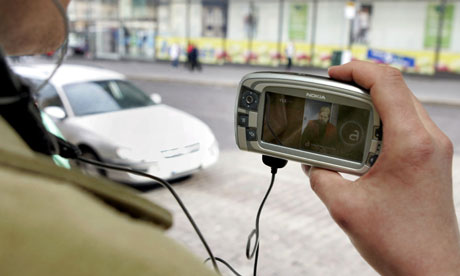Mobile phone firms test TV broadcast service
Broadcast TV could be shown using the existing 3G mobile phone spectrum – without clogging up networks

Mobile TV suffers from congestion if more than a handful of customers use the service in the same place. Photograph: Matti Bjorkman / Rex Features
O2, Orange, and Vodafone have teamed up to test a TV broadcast service which would allow British mobile phone users the chance to watch TV channels on their handsets.
The three companies, who control the bulk of the UK mobile phone market, are testing technology which would enable them to provide broadcast TV over their existing 3G mobile phone spectrum, without clogging up their networks, which are being used by smartphone users to access the web and send emails.
They are working with Ericsson, IPWireless, and Streamezzo on a three-month trial of integrated mobile broadcast (IMB) technology in west London and Slough.
All the UK mobile phone companies offer mobile TV services on their 3G networks but they suffer from congestion if more than a handful of customers use the service in the same place. IMB technology, however, uses part of the airwaves they picked up during the sale of 3G spectrum in the dying days of the dotcom boom which has lain dormant ever since.
This spectrum is perfect for broadcast services as it is "unpaired" – it cannot be used to send and receive signals so it is not used for mobile phone calls. But because it is part of the existing spectrum it works with the phone companies' systems, making it easy to bill customers. This spectrum is available to more than 150 operators across 60 countries covering more than half a billion subscribers.
The trial, which starts in October, comes after T-Mobile and Orange tested similar technology back in 2008.
"With the strong growth of data traffic on our 3G networks and the mobile industry's recent support of this high performance broadcast technology, the time is right to move forward with an IMB initiative," said Luke Ibbetson, head of technology research and development at Vodafone Group. "By joining our peers in this UK pilot, we expect to be able to explore the potential of delivering broadcast services across available 3G spectrum."
"Already a leading provider of mobile TV in Europe, our experience shows consumers will take advantage of linear broadcast services if the network experience is consistently good," said Thierry Bonhomme, head of networks, carriers and research and development at Orange. "Network capability is key for mobile TV roll-out and IMB will enable more operators to maximize the benefits they get from 3G investments with high quality TV service deployments on an efficient, pragmatic and scalable solution that works from country to country."
"We believe the road is clear for IMB now that it has been endorsed by the GSMA and supported by the wider mobile ecosystem," said Gavin Franks, head of new business development at O2. "Based on the results of the pilot, we anticipate being able to offer our consumers through our networks a range of innovative new broadcast services such as mobile TV and intelligent broadcasting that will lead to an enhanced user experience."
IPWireless and Ericsson, two of the pioneers behind the development of IMB technology within 3GPP, have partnered to deliver the end-to-end technology solution for the UK pilot.
IPWireless will supply the core 3GPP broadcast technology that will explore the performance of the TDD spectrum for mobile broadcast services. Ericsson, as the prime integrator, will provide integration services and a media platform. Streamezzo, recently acquired by Amdocs, is a leading software publisher of open mobile development platforms and will provide the rich media user interface for the pilot.
http://www.guardian.co.uk/media/2010...-service/print








 Reply With Quote
Reply With Quote


Social Networking Bookmarks